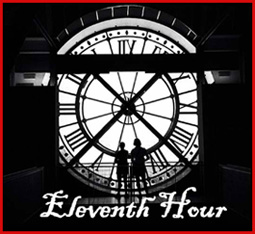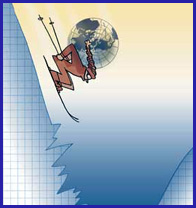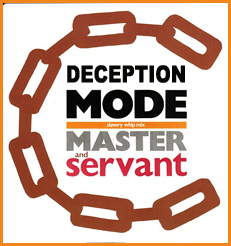
If one sought to characterize the implementation of U.S. policy on immigration, it might be safe to conclude that the old economic adage of laissez-faire is the most appropriate moniker. That is not to say that the law books are void of any legislation...plenty of laws exist. So where does that leave us? It leaves us with only one outstanding question, "Why do we have an immigration problem and what do we want to do about it?"
Finding the answer to that question may be a task we're not prepared to tackle...and if the latest vote in the Senate is any indication, it seems clear that our elected officials have chosen silence over solutions. Recall that the last time our elected officials confronted immigration in a comprehensive manner was in 1986. Twenty plus years and an estimated 12 to 20 million illegal's later, and we haven't yet found the wherewithal to try again.
From The Washington Post:
The most dramatic overhaul of the nation's immigration laws in a generation was trounced this morning by a bipartisan filibuster, with the political right and left overwhelming a coalition of Republicans and Democrats who had been seeking compromise on one of the most difficult social and economic issues facing the country.
Opponents of the bill painted the fight as a battle between the people of the United States against a government that has grown insensitive to an illegal immigrant invasion that threatens the fabric of the nation. Proponents said the Senate had succumbed to the angry voices of hate, venom and racism.
Conservatives saw the measure as amnesty for law breakers who had sneaked into the country. The ACLU objected to provisions that denied immigrants many legal rights. And labor unions saw its guest worker program as a license for big business to import cheap labor and drive down wages.
Even Latino organizations were split, with the League of United Latin American Citizens saying the guest worker program and new green card system were too punitive to support, while the National Council of La Raza pleaded with lawmakers to keep the legislation alive while its lobbyists sought changes.
My fascination with psychology and the human condition...what makes us tick...leads me to the following observations...observations that paint a woeful picture of a nation in turmoil and unable...no, make that unwilling...to find a middle ground.
Disassemble the debate anyway you want but there are only a handful of plausible explanations for what exists...a stalemate of competing goals and outcomes. Allow me to suggest that what we have witnessed is nothing more than a culmination of our self-interest, self-serving, self-centered society...a blatant demonstration of the “me first" obsession coming home to roost.
Let me explain by way of an example that is not associated with immigration...yet one that is fully related in its ability to provide an understanding of the problem. First, let me be clear that I am not offering this example to endorse Michael Bloomberg as a presidential candidate. I simply agree with his observation and I contend it speaks to the immigration issue and many others.
From USA Today:
NEW YORK — New York Mayor Michael Bloomberg, who became an independent last week, showed his non-partisan colors Wednesday by criticizing both political parties.
Bloomberg, who left the GOP and is asked almost daily about running for president, said Wednesday that neither the Republican nor Democratic Party "stands for anything."
"There isn't any philosophy" for either party, he said after a speech on improving public schools.
Bloomberg has repeatedly expressed frustration with Congress, saying lawmakers favor partisanship over progress and have failed to deal with immigration, health care or education.
"Party discipline requires you to make decisions based on what's good for the party rather than what the merits are of the piece of legislation before you," he said.
"I don't think I disagree with what any national party stands for, because I don't think that either national party stands for anything," he said.
Party platforms exist only "to give (the media) something to write about in the middle of a boring convention," he said.
There's an Old Italian saying that posits, "When a fish goes bad, it starts with the head." Let me attempt to draw the connections. What Bloomberg is alluding to is a lack of leadership...the end result of an evolutionary process whereby self-interest makes its way to the highest levels of society such that public service is no longer part of the equation. Every decision and every determination ends up being filtered through the prism of individually driven aspirations and objectives.
History tells us that the essence of government is the social contract...an agreement whereby the individual subrogates self-interest in order to establish cohesion through the establishment of a system of governance...one that can accommodate differing beliefs while still remaining impartial and equitable. Those who agree to the social contract do so knowing full well that decisions won't always serve one's self-interest but they believe that the elected caretakers will act fairly and in the best interest of the state or nation as a whole (the greater good)...avoiding preferential treatment and bias.
Coming back to immigration, I'm simply arguing that our leadership (the two parties) is so entrenched in the politics of self-interest that the welfare of the society (the greater good) is no longer the primary consideration. At the same time, the leadership has simply come to mirror the society...a society that has devolved into the machinations and minutiae of "what's in it for me?"
Politicians want to stay in power and to do so they need to appeal to their constituents as well as raise cash from corporations and interest groups. The problem is there isn't any real voter consensus for politicians to cater to. Some Americans see illegal immigrants taking their jobs...some see them as cheap labor...some see them racially as Mexicans that they don't like...some see them as more votes for the Democrats...some see them as a burden on social programs...some see them as contributors to social programs that they won't be able to benefit from due to their illegal status.
Strange as it may seem the existing immigration problem is the ironic result of all of this focus on self-interest. While everyone is jockeying to have there way, more and more immigrants have and will cross the border. In each group’s intransigent demand that they get what they want, all that is facilitated are more illegal immigrants and a compounding of the problem...making it far more complicated to resolve.
Even more disconcerting is the realization that altering the existing dynamic requires wholesale change...change that once again must originate with the individual being willing to subrogate self-interest for the benefit of the society as a whole...and that then has to percolate upward into individuals who want to lead because they accept and honor the benefits of the social contract and the cohesion it can bring to a society.
That will take time...time we may not have. That may mean we need a sea change event...a group awakening that includes a willingness to step back from self-interest in order to preserve the state...one that accepts less for the individual in order to reaffirm our commitment to preserving the social contract...the mechanism whereby equity and impartiality are given more value than individual interests.
Time moves forward...more immigrants cross the border...tick tock, tick tock...
Daniel DiRito | June 28, 2007 | 11:14 AM |
link
| Comments (0)



While a number of economists have suggested that the impact of the slow housing market may have already been felt and that the worst is over, the recent data may argue otherwise. Home sales fell to their lowest level in four years and prices dropped for the tenth straight month. Factor in foreclosure rates and the large numbers of sub-prime loans still at risk and it may be too early to conclude that the economy is out of the woods.
The National Association of Realtors reported Monday that sales of existing single-family homes and condominiums dropped by 0.3 percent to 5.99 million units in May, the slowest sales pace since June of 2003.
The median price of a home sold last month dropped to $223,700, down 2.1 percent from a year ago. It marked the 10th straight price decline compared with a year ago, the longest stretch of weakness on record.
In a troubling sign for the future, the inventory of unsold homes rose by 5 percent to 4.43 million units in May, a level that would take 8.9 months to clear out at the May sales pace. That is the highest inventory level since the last deep slump in housing in 1992.
The current slump in housing is the worst since the 1989-92 downturn. It is occurring after a prolonged boom that saw sales of new and existing homes set new records for five consecutive years.
The Realtors are predicting that the median home price will decline by 1.3 percent this year while sales are forecast to drop by 4.6 percent. It would be the first annual price decline in four decades of record-keeping.
Another potential problem is mortgage rates, which have been trending higher in recent weeks although they still remain below their historical averages.
In a worst case scenario the Federal Reserve may determine that it must raise interest rates to prevent growing signs of inflation. If that happens, interest rates on mortgages would be forced to return to more conventional levels; causing sales to decline and further driving home prices lower.
If and when that were to happen, one could also expect consumer spending to decline as more homeowners would have less disposable income and borrowing capacity. Foreclosures would likely increase because homeowners with adjustable rate loans would find themselves unable to bear the added expense. Lastly, selling a home would become more difficult since rising interest rates would further reduce the number of qualified buyers.
Perhaps the worst case scenario won’t materialize...but it also seems premature to conclude that the full effect of the housing slump has been felt. I'm of the opinion that we are in uncharted waters and it may not be wise to rely on prior historical assumptions when attempting to weigh the impact of the current housing dilemma.
Daniel DiRito | June 25, 2007 | 1:49 PM |
link
| Comments (0)



The view of the economy by the voting public seems to be moving from bad to worse. In the latest Gallup poll, only 23 percent of Americans think the economy is getting better...a full 5 percent drop in the past month. The number of Americans that feel the economy is getting worse jumped ten percent since April.
PRINCETON, NJ -- Food and gasoline prices both rose last month. At the pump, gas prices increased about 10% in May and are up almost 40% since January. In addition, average weekly wages for non-supervisory workers fell, after adjusting for inflation, for the second consecutive month in May. At the same time, the stock market continues at record highs and manufacturing output is edging upward, making factories a tad busier this year.
Such conflicting economic reports make it difficult to explain exactly why Gallup's June reading of Americans' economic views remains as negative as seen in May. A modest one in three Americans rate the economy today as either excellent or good, while the percentage saying the economy is getting better fell slightly, from 28% to 23%. Fully 7 in 10 Americans now say the economy is getting worse, the most negative reading in nearly six years.
For the first time this year, a majority of Americans are negative about the employment market, saying it is a bad time to find a quality job. Generally however, this measure remains more positive than in the period from 2002-2005.
While the numbers seem puzzling to a number of observers, I would suggest that voters have taken a longer view on the economy. There is little reason to expect energy prices to improve...the housing industry is struggling, foreclosures are up, and the prospects of low interest loans may be waning...leaving borrowers struggling to pay adjustable rates that will continue to climb.
Further, despite the relatively low unemployment rate, the real question is whether the available jobs pay enough to meet the growing costs encountered by families. We rarely see an analysis of how many Americans are in jobs they view as temporary stop gap positions that are intended to keep the family fed but that they know will not suffice in the long run.
A quick look at the rise in credit spending demonstrates as much...suggesting that many workers are able to justify the taking of lower paying jobs in the short run by using their credit to augment the deficit in income. Unfortunately, available credit is eventually exhausted and the overall debt burden coupled with the insufficient income will lead to increasing bankruptcies and a worsening economy.
Factor in voter pessimism with the Iraq war and the huge costs associated with prosecuting that war and no doubt Americans expect to bear the brunt of those expenses in reduced funds available for programs that could benefit the average worker...especially with regard to rising health care costs. If we couldn't justify a revamped healthcare system prior to the war in Iraq, what are the prospects of having the funds to enact one now?
It doesn't take an economist to understand that when a country has already doled out half a trillion dollars and counting...dollars that it is borrowing...that there will have to be sacrifices. This new trend in polling simply reflects that Americans have already begun to factor that reality into their view of the future.
Image courtesy of www.yourmoney2keep.com
Daniel DiRito | June 20, 2007 | 8:43 AM |
link
| Comments (0)



Every now and then the efforts of political parties to contort themselves in order to appeal to more and more constituent groups in the hopes of establishing a winning majority comes back to haunt them. I would argue that immigration is a case in point for our elected officials...and the bill put forth by House Republicans shines a bright light on their painful conundrum.
WASHINGTON -- In a sharp rebuke to President Bush, House Republicans unveiled legislation Tuesday that would bar illegal immigrants from gaining legal status in the U.S., require tamper-proof birth certificates for Americans and make English the nation's official language.
The measure's core principles include gaining control of the border and enforcing existing immigration laws -- it does not provide a path to citizenship for illegal immigrants as the Bush plan does.
The House bill stands virtually no chance of becoming law, or even advancing, in the Democratic-controlled Congress. Still, it casts in bold relief the split between Bush and many fellow Republicans in the immigration debate.
The authors of the House bill also are pushing for a congressional resolution detailing ways in which they believe the federal government has failed to enforce immigration law and made it easier for illegal immigrants to stay in the U.S.
"The current illegal immigration crisis is a direct result of this and previous Administrations failing to enforce or adequately enforce at least eight immigration laws," the resolution said.
Frankly, why either party chose to politicize immigration is questionable. Few issues in American politics involve so many competing interests and while politicians fashion themselves to be adept at juggling diverse constituent groups, they may have hit the proverbial brick wall with this one. They have no one to blame but themselves.
Big business has been a longtime beneficiary of our lax immigration system and we all know how politicians pander to deep pockets. At the same time, the Bush campaign sought to capitalize on his experience in Texas and make immigration reform the substrate upon which the GOP would roll out the welcoming mat for Hispanic voters.
Add in self interest in the form of nanny's, gardeners, and housekeepers...regional concerns predicated upon proximity to the Mexican border...plain old bias and prejudice...the objections of labor unions and those near the lower end of the wage scale...concerns about easy access for terrorists...and a nasty ten way tractor pull emerges.
House Speaker Nancy Pelosi, D-Calif., has told administration officials that she will not take up the bill unless about 70 Republicans are brought on board to help pass it.
The bill unveiled Tuesday is the equivalent of a warning flag that conservatives intend to fight for those Republican votes.
"It seems a formal way of putting proponents on notice that there will be resistance from those quarters in the House," said Roberto Suro, director of the non-partisan Pew Hispanic Center.
The measure would require that 18,000 border patrol agents be deployed by Dec. 31, 2008. Currently, the force totals about 12,000.
It would also require the full implementation of US-VISIT, a program that is meant to track entries and exits at all ports-of-entry but has fallen short of that goal.
U.S. citizens would be affected by many of the changes proposed for work site enforcement, including mandatory checks of all employees' eligibility and a nationwide electronic system for tracking birth and death records.
Lost in all the wrangling is any sense of responsibility for our role in enabling the mass infusion of illegal immigrants. While I recognize the fact that illegal entry is just that...illegal; the reality is that it happened because our government turned its head as those in power believed they stood more to gain from the entry of 12 million immigrants than from enforcing the existing laws that were sufficient to limit, if not prevent, the massive influx.
In the end, I'm amused by all the righteous indignation being tossed about by elected officials. An honest analysis would no doubt place blame where blame belongs...squarely on the shoulders of our pandering politicians. This latest round of feigned leadership is little more than an effort to rewrite the woeful history of a nonexistent immigration policy.
The 12 million illegal’s…servants in their own right to the ever changing interests of this country’s politician masters… have simply been pawns in a game of political cat and mouse. Isn't it time that our public servants actually begin to serve a legitimate master...the American public...and give us an honest assessment of how they intend to clean up this mess of their own making?
Daniel DiRito | June 19, 2007 | 9:33 PM |
link
| Comments (0)



Could Washington actually be serious about reducing our dependence on foreign oil? In a move that seems to signal as much, the Senate Finance Committee moved forward with a bill that would impose 29 billion dollars in new taxes on the U.S. oil industry. The bill is designed to funnel money into alternative energy exploration programs.
WASHINGTON - A proposal to hit oil companies with $29 billion in new taxes advanced in the Senate on Tuesday, targeting the money to energy conservation, wind turbines, electric hybrid cars and clean coal technology.
But Sen. Chuck Grassley, R-Iowa, said, "We have entered a new era in energy markets ...(that) requires a dramatic shift away from tax incentives for oil and gas production" and toward support for other energy sources and efficiency.
The tax package that emerged from the Finance Committee reflected the dramatic tilt of congressional sentiment toward renewable fuels — and away from support of oil companies — since Democrats took over control of Congress. In part, the shift stems from growing concerns about the impact of fossil fuels on global warming and motorists' anger over soaring gasoline prices.
The measure would extend and increase taxes paid under an oil spill liability law and eliminate existing tax credits involving foreign oil production. In all, the tax changes were expected to cost the industry more than $15 billion over a decade.
Another measure, pushed by Sen. Jeff Bingaman (news, bio, voting record), D-N.M., was aimed at collected $10.7 billion in royalties the government has been unable to collect because of flawed oil leasing contracts issued by the Interior Department in 1998-99. The government would collect an excise tax on any oil taken from the Gulf of Mexico, subject to royalties not being paid.
The bill has a long way to go to become law but lawmakers are likely concerned that high gas prices may play a role in the 2008 election cycle. Given voter frustration with energy costs, record oil industry profits, and the impression that our ongoing efforts in Iraq may be partially attributed to our need for oil, politicians may be ready to abandon their long love affair with big oil and their huge lobbying apparatus. I would suggest that the shift is long overdue.
Daniel DiRito | June 19, 2007 | 2:18 PM |
link
| Comments (1)



![]()
![]()



